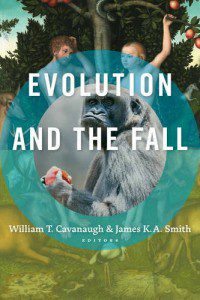 James K. A. Smith explores the theological significance of the Fall and the intersection of the Fall with original sin and evolution in his essay in Evolution and the Fall (William T. Cavanaugh, James K. A. Smith editors). Smith is a professor of philosophy at Calvin College holding the Gary & Henrietta Byker Chair in Applied Reformed Theology & Worldview. He comes at the question of the Fall from a perspective consistent with the Belgic Confession and the Heidelberg Catechism affirmed by the Christian Reformed Church. Now it is clear that both Smith and the CRC view the confession and catechism as grounded firmly in scripture. Nonetheless, it is significant that Smith refers to these statements repeatedly, but scripture only occasionally or tangentially. Although the order is different in the book, I began with Middleton’s essay before considering Smith’s chapter because I am convinced that scripture and the interpretation of scripture should take precedence over our theological constructs. Having considered Middleton’s discussion of Genesis 3, we now turn to Smith’s analysis.
James K. A. Smith explores the theological significance of the Fall and the intersection of the Fall with original sin and evolution in his essay in Evolution and the Fall (William T. Cavanaugh, James K. A. Smith editors). Smith is a professor of philosophy at Calvin College holding the Gary & Henrietta Byker Chair in Applied Reformed Theology & Worldview. He comes at the question of the Fall from a perspective consistent with the Belgic Confession and the Heidelberg Catechism affirmed by the Christian Reformed Church. Now it is clear that both Smith and the CRC view the confession and catechism as grounded firmly in scripture. Nonetheless, it is significant that Smith refers to these statements repeatedly, but scripture only occasionally or tangentially. Although the order is different in the book, I began with Middleton’s essay before considering Smith’s chapter because I am convinced that scripture and the interpretation of scripture should take precedence over our theological constructs. Having considered Middleton’s discussion of Genesis 3, we now turn to Smith’s analysis.
Smith argues that essential Christian doctrines stand on the Fall. “The grammar of Christian theology encapsulates the biblical narrative in a plot that begins with the goodness of creation, a fall into sin, redemption of all things in Christ, and the eschatological consummation of all things.” (p. 51) This narrative demands that “the goodness of creation is prior to evil“(p. 52) and that “the teaching of the goodness of creation is intended to preserve the goodness of God.”(p. 53) The Fall as an event of some sort (to be explored in greater detail), introducing sin into creation, appears to be required by these two considerations. This sets limits on faithful understandings of ‘natural’ history and of Genesis.
Smith looks at several different questions with the following conclusions or constraints:
First, faithfulness to the plot could include one original couple, but it does not require an original couple. This is a question that requires research by the community of believers. “The narrative constraint on such research is to account for scripture’s teaching about the goodness of creation, the uniqueness of humanity, and humanity’s original righteousness and rebellion into sinfulness.” (p. 56)
Second, humanity was not created perfect. We don’t need to consider evolution here at all. A perfect humanity would have been incapable of sin and the fall would have never happened. This is true whether we consider unique creation of a pair (Adam and Eve) or the evolutionary development of our species. We should consider a kind of moral immaturity that succumbed to temptation. Perfection comes only in the age to come.
 Third, the Fall was some kind of temporal event. It was historical – a movement from humanity as “good” and “righteous” to humanity as “sinful, incapable of willing the good.” In many respects, Smith bases this on the Augustinian doctrine of the Fall, affirmed in the confession and catechism. Augustine resisted any view that “would minimize the unmerited grace of God by suggesting any “inherent” human ability with respect to salvation” and “contested any teaching that would denigrate the goodness of creation.” (p. 58)
Third, the Fall was some kind of temporal event. It was historical – a movement from humanity as “good” and “righteous” to humanity as “sinful, incapable of willing the good.” In many respects, Smith bases this on the Augustinian doctrine of the Fall, affirmed in the confession and catechism. Augustine resisted any view that “would minimize the unmerited grace of God by suggesting any “inherent” human ability with respect to salvation” and “contested any teaching that would denigrate the goodness of creation.” (p. 58)
As a result, the Augustinian doctrine of the Fall and original sin has at least these two aspects:
(a) An affirmation that goodness precedes evil – and more specifically, that humanity was originally righteous before rebelling and falling into sin. The priority of this “goodness” is not only logical and theological, but also chronological: humanity is created “good” and then temporally “falls.” Let’s call this the “priority-of-the-good” thesis.
(b) A radical account of humanity as sinful, incapable of willing the good, and hence the necessity of an equally radical and unmerited grace as an action of divine initiative for redemption. Let’s call this the “necessity-of-grace” thesis. (p. 59)
Smith sees this Augustinian package (his phrase) as essential to Christian theology and his read of the biblical narrative. He goes on to suggest a potential scenario, consistent with this package and with the current consensus on human evolution (albeit stripped of the metaphysical conclusions often included in secular or atheistic articulations).
Some thoughts. I find Smith’s focus on Augustine, theology, confessions, and catechisms somewhat off-putting. We should start with the narrative plot of scripture and move to theology from there. Now I realize that the Christian theology emphasized by Smith comes from scripture, but it is shaped in its expression by specific questions that are rooted in time and place. Augustine formulated his views in light of challenges of his day, and sometimes went too far to ensure that he would prevail. I think this is also true of statements that were composed during the reformation and later. These represent human attempts to summarize and encapsulate the overall narrative of God’s story. We need to start with scripture. While I would willingly and happily attend a CRC (or other confessional) church, I would be unwilling to join such a church as a member. Perhaps this reflects my Baptist (BGC) heritage.
I also find the fixation on preserving God from creation of “a corrupt, wicked, and perverse humanity” to be a red herring. God created humans mortal and capable of temptation and sin. Creation was intended to involve process, with human kind growing and maturing before the final consummation in the age to come. I think the best approach to this is to realize that God created humanity with the freedom to obey or rebel knowing full well that only “unmerited grace” would achieve his intent in the end. The fall, as individuals and as a species, was inevitable simply because we are not God. Of course God didn’t create us fallen. But this is a truism because rebellion requires choice.
Having said this, I think that Smith’s overall discussion highlights the most important points. The biblical narrative, starting in Genesis 1-3 teaches the goodness of creation, the uniqueness of humanity, humanity’s original innocence and humanity’s rebellion into sinfulness. When it comes to rebellion into sinfulness, Middleton’s highlighting of the progression from Genesis 3 to 6 is important here, as is a consideration of 9-11 (the flood do-over didn’t succeed), the story of Abraham, Isaac, and Jacob (12-50), and the entire history of Israel.
What do you think of Smith’s approach?
How important is the doctrine of the Fall? Why?
If you wish to contact me directly you may do so at rjs4mail[at]att.net.
If interested you can subscribe to a full text feed of my posts at Musings on Science and Theology.














